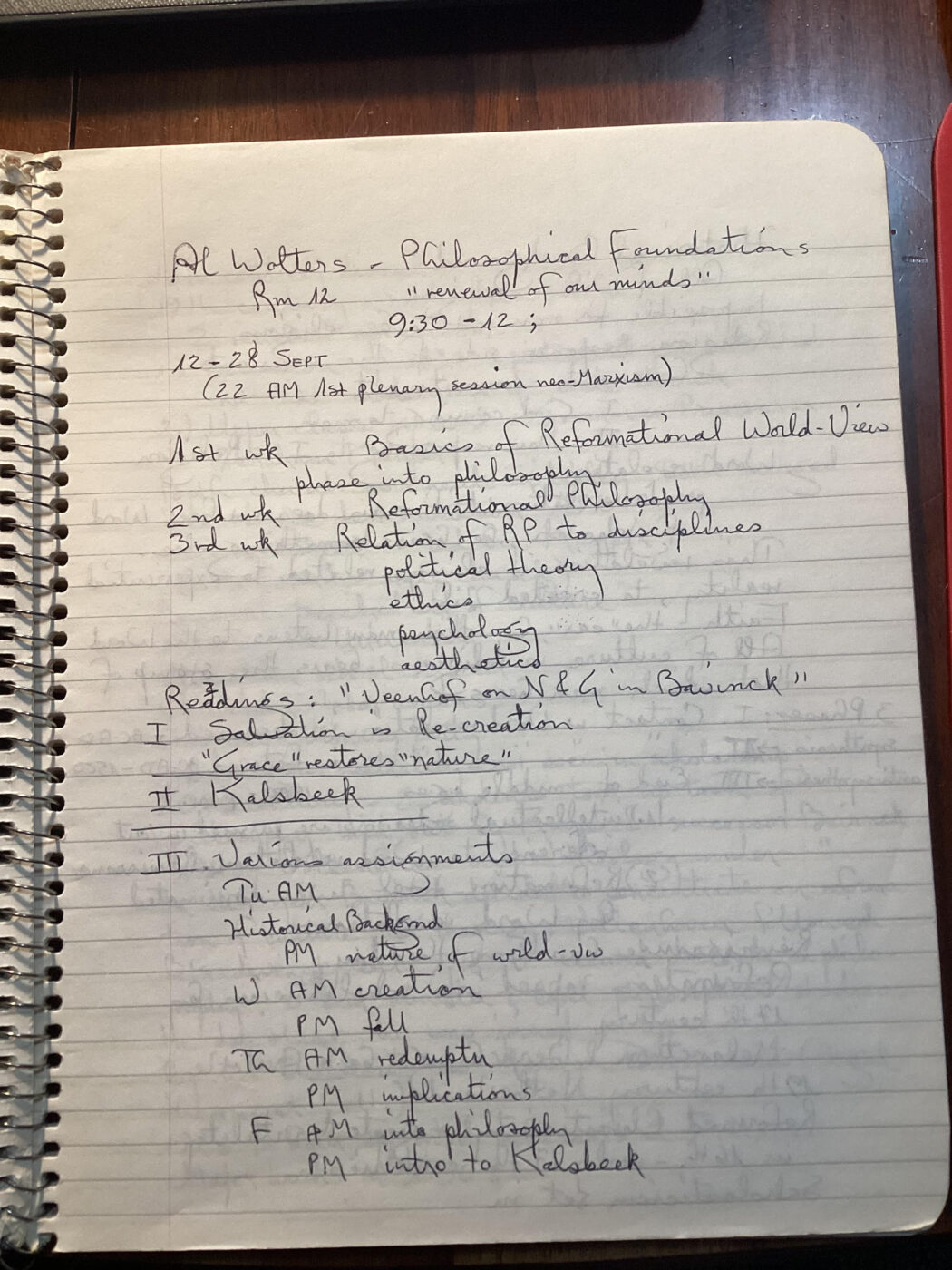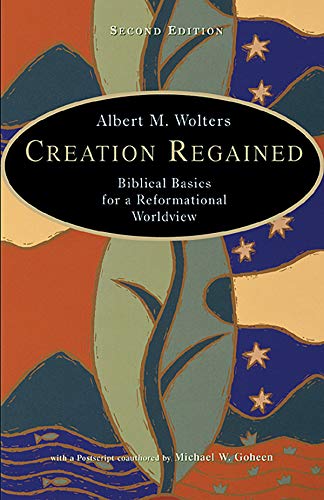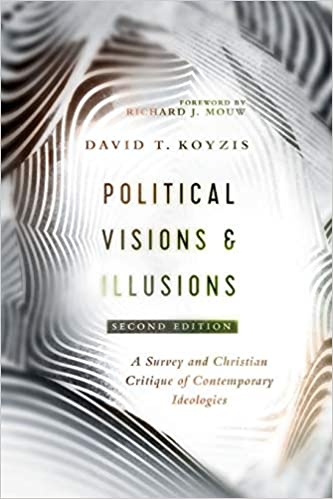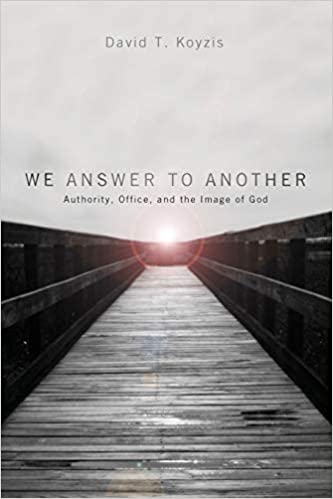by David T. Koyzis, Global Scholar, Global Scholars Canada
It was autumn of 1978. I was just beginning two years of graduate education at Toronto’s Institute for Christian Studies (ICS). Because my chosen field was political theory, I intended to study primarily under Bernard Zylstra (1934-1986), who had completed his own dissertation at the Free University under philosopher and legal scholar Herman Dooyeweerd (1894-1977). However, there were other courses I was required to take as well. One of these was a three-week crash course in Philosophical Foundations taught by Albert M. “Al” Wolters, who was then Senior Member in History of Philosophy. Unofficially known as “Boot Camp,” this course was intended to immerse incoming students in the larger neocalvinist tradition in which the ICS was grounded, preparing them for the in-depth courses awaiting them in their respective fields.

I have the notes I took for that course in front of me as I write this, seeing Wolters’ early wisdom in my own youthful handwriting with the occasional spelling error here and there. I treasure this notebook for two reasons. First, Al would later become a great friend for whom I have considerable affection. And, second, this “boot camp” course would become Creation Regained: Biblical Basics for a Reformational Worldview (Eerdmans, 1985, 2005) several years later. Perhaps more than any other single book, Creation Regained had a significant impact on my own writings, including Political Visions and Illusions. Why is Wolters’ book so important?

To be sure, it was not the first book to introduce Christians to the notion of a biblical worldview. The works of Harry Blamires (1916-2017), Francis Schaeffer (1921-1984), and James Sire (1933-2018) had already done that. But Wolters did more than his predecessors to spell out the precise contours of that worldview and to show how it flowed out of the central redemptive story in the Bible. That story consists of a three-act drama beginning with creation, proceeding to the fall into sin, and finally to redemption in Jesus Christ through the ministry of the Holy Spirit. This focus on narrative is significant because it tells us that we ought not to read the Bible as though it were a static collection of moral precepts or a mere source of wisdom. Yes, the Scriptures do offer guidance for our lives and teach us the wisdom we require to flourish as those created in God’s image. But other religions claim to offer guidance and wisdom as well. Where the Bible is unique is in faithfully recounting God’s acts in history, culminating in his sending his Son Jesus Christ into the world for our salvation. This story is relevant, not only to what we do on Sunday mornings in church or in our personal prayers during the week. It is a universal story in which we ourselves have a place, and it conditions our entire lives before the face of God.
This story structures the chapters of Creation Regained:
- What Is a Worldview?
- Creation,
- Fall,
- Redemption, and
- Discerning Structure and Direction, followed by a Conclusion.
In the second edition, published twenty years after the first, Wolters co-authored a postscript with Michael Goheen titled, “Worldview Between Story and Mission.”

Wolters sees worldview playing a central role in the lives, not only of Christians, but of all human beings created in God’s image. A worldview provides orientation and guidance as we live our lives. It is foundational for everything else. Indeed, it is impossible to exist without one. “We need some creed to live by, some map by which to chart our course. The need for a guiding perspective is basic to human life, perhaps more basic than food or sex” (5). Synonyms include “life perspective,” “confessional vision,” “principles,” “ideals,” and “system of values” (2). Another possibility, which I favour, is basic heart orientation in that it describes the centring of our heart on something to which we ascribe ultimacy. For Christians our worldviews must constantly be tested by the Scriptures, lest we unknowingly absorb the basic beliefs and faux-redemptive narratives of the surrounding culture and thereby live divided lives.
What will likely strike first-time readers is that Wolters’ chapter on creation is much longer than the others, making up just over one-quarter of the book’s total length. This may puzzle some Christians. After all, isn’t our faith about redemption? Shouldn’t we start with Jesus Christ, who has paid the price for our sins and secured eternal life for us? Our faith does indeed centre in Christ, but if our worldview takes the form of a story, then we necessarily must start at the beginning, namely, with creation. However, there is more than one meaning to creation. We sometimes use it to describe the natural world: the trees of the forest, the mountains, the beasts of the field, and so forth. Against this view Wolters affirms that everything that is not God has been brought into being by him and is thus a creature of some sort. In this sense, creation covers not only the natural world, but human culture and society as well. Again, we sometimes use creation to describe what the Bible recounts in Genesis 1:1: “In the beginning God created the heaven and the earth.” But creation is more than just an initiating act; it is the very panorama in which we are embedded and live our lives coram Deo—before the face of God. Creation has a lawful character, and indeed Wolters uses law “to stand for the totality of God’s ordaining acts toward the cosmos” (15). Within this general framework Wolters distinguishes between the laws, such as gravity, that operate immediately and the norms, such as justice, which require human responsibility to implement. This creation is the space that we share with all other human beings, and not just with believers.
The chapter devoted to the fall is only fifteen pages long, but its relative brevity in no way understates sin’s devastating effect on creation. The fall has affected not just one part of life but the whole of life. The fall has misdirected our faith and everything that flows out of it. If we put our faith in something created, we will be unable to isolate our chosen idol within a small corner of our existence. Some Christian traditions operate as if the fall has affected a sphere of supernatural grace while leaving relatively untouched a realm of nature and reason. But, no, the fall is cosmic in scope. Nevertheless, drawing implicitly on Augustine’s insight, Wolters observes that sin is parasitical on God’s good creation. It is not creative in itself; it merely deforms created goods.
Amid this sad state of affairs, beginning with our first parents’ sin of disobedience in the garden, God has made provision to set matters aright—to reclaim his creation from the power of sin. He has sent his Son Jesus Christ into the world to take our sin upon himself and to bear the punishment we deserve, securing our salvation. But salvation is not only for God’s human creatures. Like sin, redemption too is cosmic in scope, restoring the good creation that humanity has mismanaged and scarred. Redemption is not a matter of grace being added on top of nature, but of grace restoring nature, an insight which, judging from my handwritten notes, I must have learnt that very first day of ICS Boot Camp four decades ago. Of course, we await the final consummation of God’s kingdom, but due to the work of Christ, the ultimate victory is assured. Of that we can be confident.
For the moment, we live in between the times. Christ has scored the definitive victory over sin and death on the cross, and his kingdom is now among us. Nevertheless, the full realization of that kingdom awaits Christ’s second coming. At present, the Holy Spirit is working as a leavening agent to spread the kingdom throughout the whole creation. For us the key to living in the present age is to exercise spiritual discernment in everything we undertake, which requires distinguishing between created structure and spiritual direction in the phenomena which we encounter daily. In this way we engage in reformation rather than revolution. Revolution pretends that it’s possible to sweep away entire structures and begin anew on an ostensibly more rational basis, as occurred in 1789 and 1917. In typical gnostic fashion, revolutionaries deprecate something in the created order, failing to discern the positive features in the society they seek to overturn. By contrast, reformation entails retaining what is good and seeking to improve it. As Wolters puts it, “reformation always takes as its point of departure what is historically given and seeks to build on the good rather than clearing the historical terrain radically in order to lay an altogether new foundation” (93). Why? Because the good remains in every society and culture despite its distortions, and our efforts to build anew will inevitably be affected by sin despite our best efforts.
In the postscript, Wolters and Goheen expand the three-act drama into six acts: (1) creation, (2) human rebellion against God’s purposes, (3) God’s announced plan to crush sin, (4) the coming of Jesus of Nazareth into the world, (5) the mission of God’s people to witness to his kingdom, and (6) final judgement and renewal of creation.
So thoroughly have I been shaped by Wolters’ categories and distinctions over more than four decades that they are found throughout my two published books. After I wrote the first edition of Political Visions and Illusions, where I treated political ideologies as manifestations of idolatry, I eventually concluded that this was not enough. I needed to bring the underlying stories in which they are rooted to the surface and expose them to critical scrutiny. These stories constitute redemptive narratives parallel to and parasitical on the biblical story. Therefore, in the second revised and expanded edition, I decided to incorporate a narrative analysis of each of the ideologies. What stories do they tell? and to whom or what do they look for salvation? Different salvation stories are fundamentally incompatible, and which story we believe will ultimately determine the way we live our lives.
As of 2005, Creation Regained had been translated into eight languages, and I would not be surprised if there are even more by now. By God’s grace, it is having a global impact and has become the gold standard for Christian worldview books. If you have not yet read it, by all means obtain a copy and move it to the top of your to-read pile. You will be glad you did.
To learn more about the man Al Wolters go here.
David Koyzis has been a Global Scholar since 2019. He is an academic political scientist with a PhD in Government and International Studies from the University of Notre Dame, where he wrote a dissertation comparing the political thought of Herman Dooyeweerd and Yves R. Simon. He’s the author of Political Visions and Illusions and We Answer to Another: Authority, Office, and the Image of God. David taught political science at Redeemer University College for thirty years, mentoring hundreds of young people who have gone on to contribute to public life in Canada and elsewhere. In recent years he has broadened his academic ministry through contacts in Brazil, Pakistan, Ukraine, Indonesia, Germany, Finland, and elsewhere. You can read his blog here and more about his work with Global Scholars Canada here.
TO BUY BOOKS BY WOLTERS, KOYZIS, OR ANYONE:
Please visit Hearts & Minds Books. We here at the Layman’s Lounge are glad you’ve enjoyed our latest offering. We believe deeply in the Lordship of Christ over all of life and are eager to think about even how to shop to the glory of God. That might mean, we’d suggest, supporting human-scale businesses that do good work, that are in some ways consistent with our hopes to see a reformation in culture and in the habits of our public lives. To that end, we’d invite you to order any books mentioned here from our friends at Hearts & Minds, a family-owned, indie bookstore in Dallastown PA. Use the promo code LL20 (or just say you heard about them in the Lounge) and they will deduct 20% off your order (and do listen to our interview with Byron Borger, the great curator/owner of Hearts & Minds here). (There may be a few exceptions if books are out-of-print, self-published or rare.) Just type in what you want at the interactive, secure order form at their website: www.heartsandmindsbooks.com or send Byron an inquiry at read@heartsandmindsbooks.com. You can call them at 717-246-3333.
Creation Regained: Biblical Basics for a Reformational Worldview

Political Visions & Illusions: A Survey & Christian Critique of Contemporary Ideologies

We Answer to Another: Authority, Office, and the Image of God



